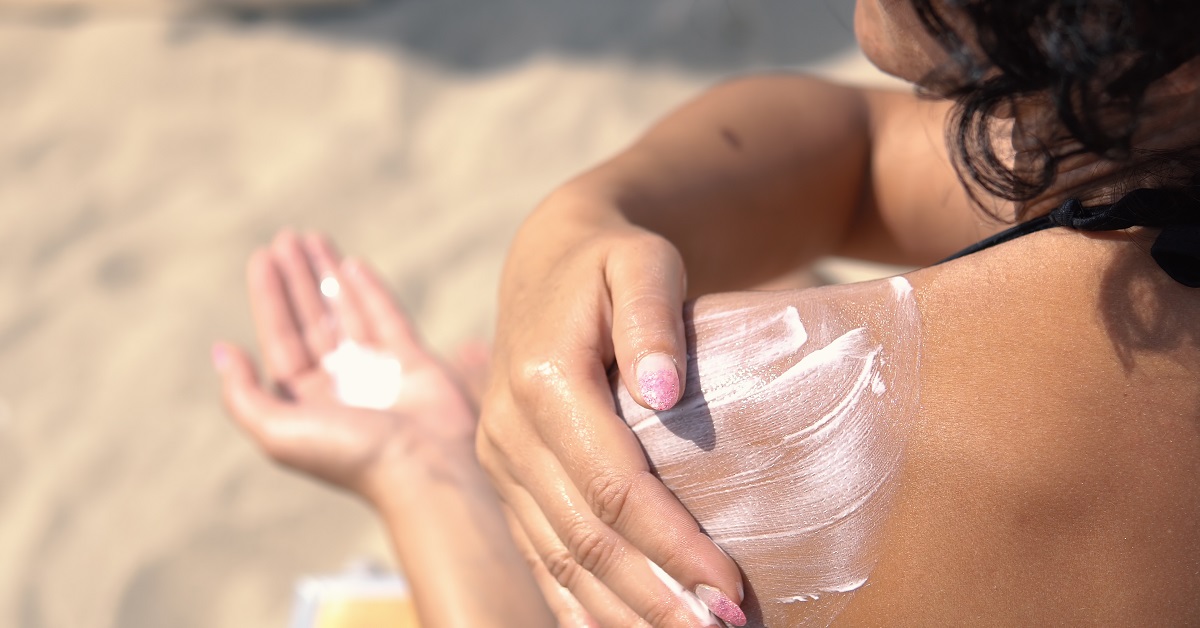Sunscreen is an essential part of your arsenal against skin cancer and sun damage. It helps protect our patients from the damaging ultraviolet (UV) rays of the sun, as well as other environmental factors that can cause premature aging and potential skin cancers.
It’s important to understand how sunscreen works and what ingredients are best for your skin type. This guide will provide you with information to help you make informed decisions about which sunscreen you should use to get the most protection possible while still enjoying activities outdoors.
What is the difference between chemical and physical sunscreen?
Chemical sunscreen is formulated with active ingredients that absorb ultraviolet radiation from the sun’s rays before they can penetrate and damage your skin. These active ingredients are usually organic compounds like oxybenzone, avobenzone, octinoxate, homosalate, and octocrylene.
Physical sunscreen, on the other hand, works by forming a barrier on your skin that reflects and scatters UV rays away from your body. Examples of physical sunscreen active ingredients include zinc oxide, titanium dioxide, and iron oxide.
When it comes to selecting a sunscreen, it’s important to understand the differences between chemical and physical sunscreens and the pros and cons of each.
Chemical sunscreens are often lighter in texture and easier to apply, they usually have a longer shelf life than physical sunscreens, and they offer broad-spectrum protection against UVA and UVB rays. However, they can cause skin irritation or cause allergic reactions in some individuals.
Physical sunscreens, on the other hand, are thicker and may be less cosmetically appealing than chemical sunscreens, can be harder to apply evenly, and often have shorter shelf lives. However, they provide broad-spectrum protection from UVA and UVB rays without irritating or causing allergies in most people.
What are some of the most common active ingredients in sunscreen?
The most common active ingredients in sunscreen are:
- Oxybenzone: A chemical filter that absorbs UV radiation and has been approved for use by the FDA.
- Avobenzone: A chemical filter that absorbs both UVA and UVB radiation and is often used in combination with other filters for broad-spectrum protection.
- Octinoxate: A chemical filter that absorbs UV radiation and is often used in combination with other filters for broad-spectrum protection.
- Homosalate: A chemical filter that absorbs UV radiation and may be used alone or in combination with other filters for broad-spectrum protection.
- Octocrylene: A chemical filter that absorbs UV radiation and is often used in combination with other filters for broad-spectrum protection.
- Zinc oxide: A physical blocker that reflects and scatters both UVA and UVB radiation away from the skin.
- Titanium dioxide: A physical blocker that reflects and scatters both UVA and UVB radiation away from the skin.
- Iron oxide: A physical blocker that reflects and scatters both UVA and UVB radiation away from the skin.
How does sunscreen work to protect my skin from the sun?
Sunscreen works by blocking, reflecting, and/or scattering ultraviolet radiation from the sun’s rays before they can penetrate and damage your skin. Chemical sunscreens absorb UV radiation while physical sunscreens reflect and scatter it away from the skin. This helps to protect against premature aging, wrinkles, dark spots, and skin cancer.
Sunscreen also helps to protect against photoaging, which occurs when your skin is exposed to UV radiation over time and becomes prematurely aged, wrinkled, and discolored. A broad-spectrum sunscreen with an SPF (sun protection factor) of 30 or higher can help to prevent this kind of damage by blocking both UVA and UVB radiation.
Do I need to apply sunscreen if I am not going to be outside for very long?
Yes! Even if you are only going to be outside for a short period, it is still important to wear sunscreen. UV radiation can still damage your skin even when you are only outside for a few minutes. Remember to apply sunscreen to all exposed skin and reapply every two hours or more often if you are swimming or sweating.
Should I use a different sunscreen if I am going to be swimming or sweating?
Sweat and water can reduce the effectiveness of some sunscreen ingredients. To ensure that you are getting adequate protection, it is recommended to use a water-resistant, broad-spectrum sunscreen with an SPF of 30 or higher when swimming or sweating. Additionally, remember to reapply your sunscreen every two hours or more often if you are swimming or sweating.
Is it possible to get a sunburn even if I am using sunscreen?
It is still possible to get sunburned even when you are using sunscreen. Sunscreen can help protect you from the sun’s rays, but it should not be your only line of defense against UV radiation. Be sure to wear protective clothing, seek shade during peak sunlight hours, and avoid tanning beds to further protect your skin.
What are some of the signs that I might be experiencing a reaction to sunscreen?
If you are experiencing any of the following signs, you may be having an allergic reaction to your sunscreen:
- Skin irritation such as redness, itching, or burning
- Swelling
- Hives
- Rash
Stop using the sunscreen and contact us if these symptoms persist. Additionally, it is important to check the ingredients of your sunscreen to ensure that you are not allergic to any of them.
How often should I reapply sunscreen during the day?
It is recommended to reapply your sunscreen every two hours or more often if you are swimming or sweating. Additionally, it is important to check the expiration date of your sunscreen and replace it if necessary. Sunscreens can lose their effectiveness over time and should be replaced every one to two years. Lastly, remember to apply a generous amount of sunscreen to all exposed skin. A dime-sized amount is recommended for the face and two tablespoons for the body.
Is there anything else I can do to protect my skin from the sun besides using sunscreen?
Yes! Wearing protective clothing, seeking shade during peak sunlight hours, and avoiding tanning beds can all help to protect your skin from UV radiation. Additionally, it is important to check the ingredients of your sunscreen and ensure that you are not allergic to any of them. Lastly, remember to apply a generous amount of sunscreen to all exposed skin and reapply it every two hours or more often if you are swimming or sweating. Taking these measures will help to keep your skin safe while enjoying the outdoors.
To learn more about sunscreen; how to help prevent, diagnose, or treat skin cancer; as well as the effects of photoaging, schedule an appointment with Atlanta’s premier Dermatology Medical Providers by clicking the “Request a Consultation” button on this page.


